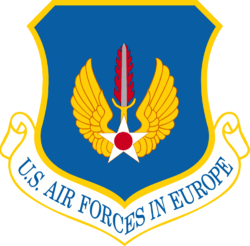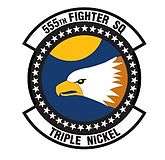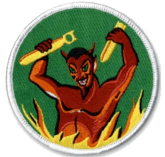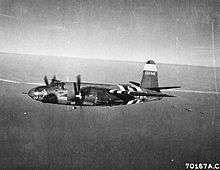555th Fighter Squadron
555th Fighter Squadron
 | |
|---|---|
 Over Iraq, a Squadron F-16C Fighting Falcon peels away from a KC-135 Stratotanker from the 92d Air Refueling Squadron | |
| Active | 1942–1945; 1964–1994; 1994–present |
| Country |
|
| Branch |
|
| Role | Fighter |
| Part of | United States Air Forces in Europe |
| Garrison/HQ | Aviano Air Base |
| Nickname(s) | Triple Nickel |
| Motto(s) | Once Green, Always Green |
| Colors | Green |
| Engagements |
Linebacker I Linebacker II |
| Decorations |
Distinguished Unit Citation Presidential Unit Citation Air Force Outstanding Unit Award with Combat "V" Device Air Force Outstanding Unit Award Republic of Vietnam Gallantry Cross with Palm |
| Commanders | |
| Current commander | Lt.Col Matthew Kmon |
| Notable commanders |
Joseph Kittinger David L. Goldfein |
| Insignia | |
| 555th Fighter Squadron emblem (approved 29 August 2007)[1] |
 |
| 555th Tactical Fighter Squadron emblem (approved 13 March 1975)[1] |
 |
| 555th Bombardment Squadron emblem[2] |
 |
The 555th Fighter Squadron is part of the 31st Operations Group at Aviano Air Base, Italy. It operates General Dynamics F-16 Fighting Falcon aircraft conducting an air superiority mission.
Mission
The 555th Fighter Squadron provides combat airpower on demand to U.S. and NATO Combatant Commanders as well as the National Command Authority in order to meet National Security objectives.
It also performs air and space control and force application roles of counterair, strategic attack and counterland, including interdiction and close-air support, with 21 F-16CMs employing state of the art munitions in support of the joint, NATO, and combined operations.
History
World War II

![]()
The squadron's heritage began on 25 November 1942 when the 555th Bombardment Squadron, Medium, was constituted flying the Martin B-26 Marauder. During World War II, the 555th led offensive actions against Axis forces from bases in England, France, and Belgium. For gallantry in action, the squadron was awarded the first of its four Presidential Unit Citations.[3] The squadron was inactivated shortly after the war ended.
Vietnam Era & Late Cold War Era

On 8 January 1964, the 555th re-emerged at MacDill Air Force Base, Florida as the 555th Tactical Fighter Squadron (555 TFS), operating the McDonnell Douglas F-4C Phantom II. The squadron was organized from elements of the 557th, 558th and 559 TFS at MacDill, when the parent 12th Tactical Fighter Wing (12 TFW) reduced the number of aircraft from three squadrons of 25 aircraft each to four squadrons of 18 aircraft.
The conflict in Southeast Asia was escalating and throughout 1965 the wing supported Pacific Air Forces (PACAF) Contingency Operations by rotating combat squadrons quarterly to Naha Air Base, Okinawa, in the Ryukyu Islands. At Naha AB, the squadrons were part of the 51st Fighter Interceptor Wing (51 FIW) and performed as air defense interceptor squadrons for the Ryukyu Islands. The 555th had flown its planes to Naha AB in December 1964 on the first three-month rotation. Later, the 555th was chosen to return to Naha AB and left MacDill AFB on 6 November 1965 via C-135 Stratolifter transports. The 555th relieved the 559th at Naha and assumed control of its F-4 aircraft and other assets. The 12 TFW was slated to open Cam Ranh Bay Air Base, South Vietnam (RVN). The air defense mission in Okinawa could not be abandoned and a decision was made to keep the 555th there until a replacement unit could be identified. The remainder of the 12 TFW deployed to Cam Ranh Bay beginning in November 1965.
An F-102 fighter-interceptor squadron at Hamilton AFB, California was picked to replace the 555th at Naha. The F-102 was not able to air refuel, so the F-102s were modified to a U.S. Navy and NATO style probe and drogue refueling configuration and the pilots trained to perform air refueling, a new concept for a fighter-interceptor squadron. The F-102s arrived at Naha in late February 1966. A decision was made to send the 555th to Udorn Royal Thai Air Force Base (Udorn RTAFB) in Northern Thailand, near Vientiane, Laos, and not to join the other three 12th TFW squadrons at Cam Ranh Bay. Cam Ranh could hold only four F-4C squadrons. 391 TFS had arrived at Cam Ranh awaiting runway construction at Phan Rang. Until the 391st rejoined 366 TFW, the 12th could not accommodate the 555th (lack of space). The decision to assign 555th at Udorn was validated in April 1966 when the 555th downed five North Vietnamese Air Force MiG fighters. A sixth MiG was downed by an F-4C from DaNang AB, RVN.
Udorn RTAFB was small and when a squadron of USAF F-104As was brought there, it was decided to send two flights, half of the 555th, to Ubon RTAFB. There was not enough billeting for the entire 555th at Ubon and what was available was not adequate for daytime rest. The 8 TFW was the resident unit at Ubon and were flying only night missions (Night Owl) into North Vietnam. During the first two weeks at Ubon, the 555th flew day strikes into North Vietnam. A barracks-type building was hastily constructed to house the entire 555th and the remaining half of the squadron was brought to Ubon in July 1966, at which time the entire squadron began flying Night Owl missions. However, the new building was not air conditioned, so the 555th flew from sunset to about 2300 hours local time. The two squadrons of the 8 TFW flew the missions from 2300 to sunrise. Later in 1966, the 555th was transferred from the 12 TFW to the 8 TFW.
The 8 TFW later became known as the "Wolfpack" and the 555th led the first strike against MiG airfields in North Vietnam. The 555 TFS launched night bombing attacks against North Vietnam on 29 September 1967. While at Ubon, the 555th downed additional Migs, including four Mikoyan-Gurevich MiG-21s on 2 January 1967. The unit thus became the only "Quad Ace" fighter squadron to that point, with 20 MiGs to its credit.[3]
In 1968, the Triple Nickel participated in the campaign against the Ho Chi Minh Trail and the Linebacker campaigns against the North Vietnam heartland in 1972. During Linebacker I and Linebacker II, the 555th returned to its air superiority role and brought its MiG tally to 39 confirmed victories with ten MiG-17s, three MiG-19s, and twenty-six MiG-21s, producing the first and second USAF aces, and earning the motto, "World's Largest Distributor of MiG Parts". From 1966 to 1973, the 555th Tactical Fighter Squadron earned three more Presidential Unit Citations, five Air Force Outstanding Unit Awards with Combat "V" device, the Republic of Vietnam Gallantry Cross with palm, and the 1973 Hughes achievement award.[3]
After nine years of combat operations, the 555th returned to the United States. In 1974, the squadron moved to Luke Air Force Base, Arizona, where it transitioned to the McDonnell Douglas F-15 Eagle and became part of the 405th Tactical Training Wing, training pilots transitioning to the F-15 Eagle.
The squadron was redesignated the 555th Fighter Squadron (555 FS) on 1 November 1991 and inactivated on 25 March 1994.
Reactivation in Italy
On 1 April 1994, the unit was reactivated and reassigned to U.S. Air Forces in Europe (USAFE)) and NATO and stationed at Aviano Air Base, Italy, absorbing the General Dynamics F-16 Fighting Falcon and equipment of the inactivated 526th Fighter Squadron, which had been inactivated at Ramstein Air Base, Germany when the 86 FW became an airlift wing (86 AW) following the inactivation of the 435th Airlift Wing and the downsizing of its former installation, Rhein-Main Air Base, Germany. At Aviano, the squadron returned to its previous mission as an operational combat fighter squadron.[3]
2013 Sequestration
Air Combat Command (ACC) officials announced a stand down and reallocation of flying hours for the rest of the fiscal year 2013 due to mandatory budget cuts. This also impacted USAF tactical flying units in USAFE, PACAF, the Air Force Reserve Command and the Air National Guard. The across-the board spending cuts, called sequestration, took effect 1 March 2013 when Congress failed to agree on a deficit-reduction plan.[6]
Squadrons either stood down on a rotating basis or kept combat ready or at a reduced readiness level called "basic mission capable" for part or all of the remaining months in fiscal year 2013.[6] This affected the 555th Fighter Squadron with a stand-down grounding from 9 April to 30 September 2013.[6]
Operations
Lineage
- Constituted as the 555th Bombardment Squadron (Medium) on 25 November 1942
- Activated on 1 December 1942
- Redesignated: 555th Bombardment Squadron, Medium on 9 October 1944
- Redesignated: 555th Bombardment Squadron, Light on 23 June 1945
- Inactivated on 7 November 1945
- Redesignated 555th Tactical Fighter Squadron, activated and organized, on 8 January 1964
- Redesignated 555th Tactical Fighter Training Squadron on 5 July 1974
- Redesignated 555th Fighter Squadron on 1 November 1991
- Inactivated on 25 March 1994
- Activated on 1 April 1994[1]
Assignments
- 386th Bombardment Group, 1 December 1942 – 7 November 1945
- 12th Tactical Fighter Wing, 8 January 1964 (attached to 51st Fighter Interceptor Wing, 12 December 1964 – 9 March 1965, 11 December 1965 – 21 February 1966, 8th Tactical Fighter Wing, c. after 22 February 1966)
- Thirteenth Air Force, 4 Mar 1966 (attached to 8th Tactical Fighter Wing until 24 March 1966)
- 8th Tactical Fighter Wing, 25 March 1966
- 432d Tactical Reconnaissance Wing, 1 June 1968
- 58th Tactical Fighter Wing (later 58 Tactical Training Wing), 5 July 1974
- 405th Tactical Training Wing, 29 August 1979
- 58th Operations Group, 1 October 1991 – 25 March 1994
- 31st Operations Group, 1 April 1994 – present[1]
Stations
|
|
Aircraft
- Martin B-26 Marauder (1943–1945)
- Douglas A-26 Invader (1945)
- McDonnell Douglas F-4 Phantom II (1964–1974)
- McDonnell Douglas F-15 Eagle (1974–1994)
- F-16C/D block 40 Fighting Falcon (1994 – present)[1]
References
- Notes
- ↑ "The Yankee Guerilla" was a Martin B-26C-15-MO Marauder, AAF Ser. No. 41-34946. Its pilot lost control of the aircraft while returning from a 5 October 1944 mission in the area of Duren Barracks in Southwestern Germany and the plane crashed into a vacant house 5 miles northwest of Compeigne, France.
- ↑ Aircraft is McDonnell F-4D-28-MC Phantom II, AF Ser. No. 65-0683, circa January 1972. This aircraft was retired to AMARC at Davis-Monthan AFB on 6 May 1988 and scrapped on 2 January 1997.
- Citations
- 1 2 3 4 5 6 7 Dollman, TSG David (16 October 2016). "Factsheet 555 Fighter Squadron (USAFE)". Air Force Historical Research Agency. Retrieved 23 November 2016.
- ↑ Watkins, pp. 72–73
- 1 2 3 4 "Fact Sheets: 555th Fighter Squadron "Triple Nickel"". 31st Fighter Wing Public affairs. 15 April 2009. Archived from the original on 17 December 2013. Retrieved 24 November 2016.
- ↑ Martin
- ↑ Baugher, Joe (12 December 2009). "USAAS-USAAC-USAAF-USAF Aircraft Serial Numbers--1908 to present". Archived from the original on 22 January 2010.
- 1 2 3 Everstine, Brian; Weisgerber, Marcus (8 April 2013). "Reduced flying hours forces grounding of 17 USAF combat air squadrons". Air Force Times. Retrieved 21 December 2016.
Bibliography
![]()
- Martin, Patrick (1994). Tail Code: The Complete History of USAF Tactical Aircraft Tail Code Markings. Schiffer Military Aviation History. ISBN 0-88740-513-4.
- Maurer, Maurer, ed. (1983) [1961]. Air Force Combat Units of World War II (PDF) (reprint ed.). Washington, DC: Office of Air Force History. ISBN 0-912799-02-1. LCCN 61060979.
- Maurer, Maurer, ed. (1982) [1969]. Combat Squadrons of the Air Force, World War II (PDF) (reprint ed.). Washington, DC: Office of Air Force History. ISBN 0-405-12194-6. LCCN 70605402. OCLC 72556.
- Ravenstein, Charles A. (1984). Air Force Combat Wings, Lineage & Honors Histories 1947-1977 (PDF). Washington, DC: Office of Air Force History. ISBN 0-912799-12-9.
- 555th Fighter Squadron Fact Sheet
External links
| Wikimedia Commons has media related to 555th Fighter Squadron (United States Air Force). |

.png)